Difference Between WhatsApp, WhatsApp Business, WhatsApp Business API

Understanding the difference between regular WhatsApp and WhatsApp Business is really important if you want to use WhatsApp for marketing. There's also WhatsApp Business API for bigger businesses.
WhatsApp is super popular with 2 billion people using it every month! This makes it a great platform for businesses. You can use it for customer service, sending messages about transactions, and running marketing campaigns. Plus, since people usually check their messages on WhatsApp more often than emails, it's a good way to reach them.
WhatsApp has lots of features that can help with marketing, like interactive messages, sending different types of media, showing product catalogs, and using QR codes to reach people on different platforms.
But it's crucial to pick the right type of WhatsApp account for your business. Let's take a look at the three options so you can decide which one suits you best.
- WhatsApp Messenger
- WhatsApp Business
- WhatsApp Business API
At a glance: the main differences
This table compares the three WhatsApp apps, key differences, and functionalities.
| WhatsApp Messenger | WhatsApp Business | WhatsApp Business API |
|---|---|---|
| For personal use | For SMBs | For mid/large businesses |
| 1:1 messages | Ad hoc customer service Small-scale marketing | Mass messaging campaigns Strategic customer service |
| App, browser | App, browser | Solution Provider interface |
| 1 user, 4 devices max | 1 user, 4 devices max | Unlimited users & devices |
| No business tools | Business profile Product catalog Broadcast messages (limited to 256 contacts at a time) Automated messages (limited) Create and participate in group chats No green tick for official account | Business profile Product catalog Broadcast messages Automated messages (chatbots, transactional) Session messages Create but not participate in group chats Green tick for official account possible |
| Contacts from phone that have WA account | Contacts from phone that have WA account | Contacts are imported from opt-in list |
| Free | Free | Paid |
1. WhatsApp Messenger
Regular WhatsApp is for talking to your friends and family. You can download it for free on Android or iPhone. It lets you chat with one person or groups of people.
When you give WhatsApp access to your phone contacts, you can talk to anyone who also has WhatsApp. You can also make phone calls and video calls with it.

But if you're a business owner, regular WhatsApp isn't that useful. You can't automate things, and you can only talk to people who are in your phone contacts.
Really small businesses might be able to use regular WhatsApp to talk to customers, but as they grow, they'll need something better.
2. WhatsApp Business
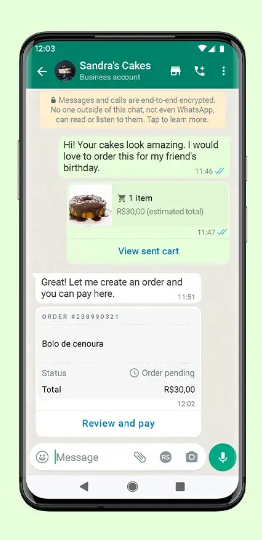
The WhatsApp Business platform is a separate app version of WhatsApp aimed specifically at businesses. Even their logos are different.
WhatsApp Business provides basic tools for business messaging for micro and small businesses.
It’s still free to use and there’s a browser version. It offers the same basic features as the one for personal use — both sides can start chats, and you can participate in group chats.
What’s the difference between WhatsApp and WhatsApp Business?
WhatsApp is for talking to friends, while WhatsApp Business is for businesses to talk to customers. WhatsApp Business has special features like showing products and setting up messages for when you're not available.
If you have both WhatsApp and WhatsApp Business on your phone, they need different phone numbers. You can use a regular phone number or a landline for WhatsApp Business. It's helpful to use a phone with two SIM cards so you can manage both accounts easily.
Learn more: How to make a WhatsApp business account
Then, you can add an image, working hours, website, and physical address to your profile to present your business. Another great feature is the ability to create a product catalog within the WhatsApp Business app to showcase your products. It can include images, prices, and even links back to your site. The catalog can also be shared as one dedicated link.
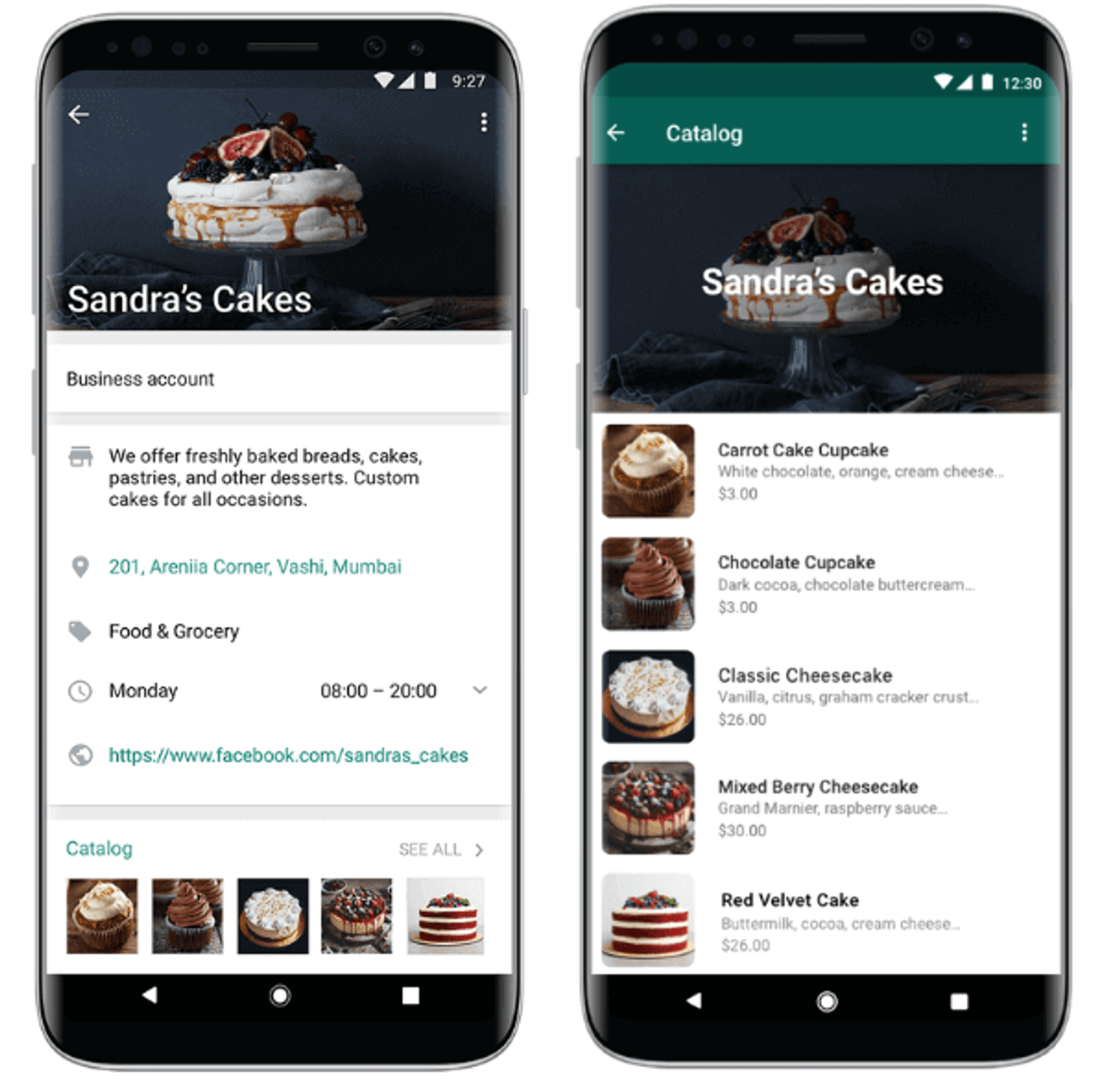
Source: newsfeed.org
Chats originating from a business account are indicated as such.
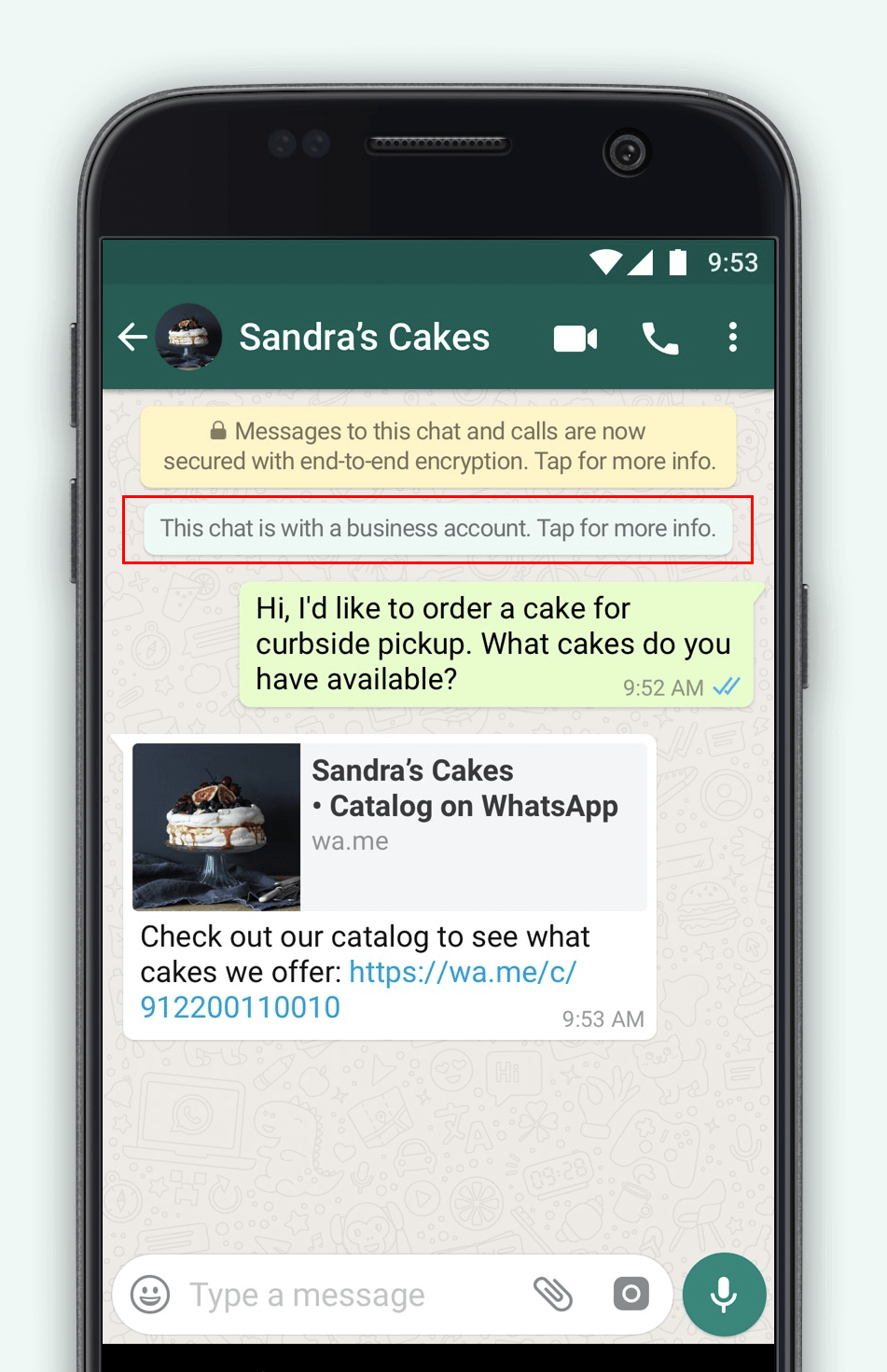
Business tools offered by WhatsApp for Business
Label conversations. WhatsApp Business lets you manage contacts with labels (e.g. new customer, complaint, loyal customer, urgent). This is useful when trying to keep track of conversations and when creating lists for WhatsApp broadcasts.
Short links and QR codes. These open a direct chat with your business account. They can be shared across your channels as a quick way of contacting you.
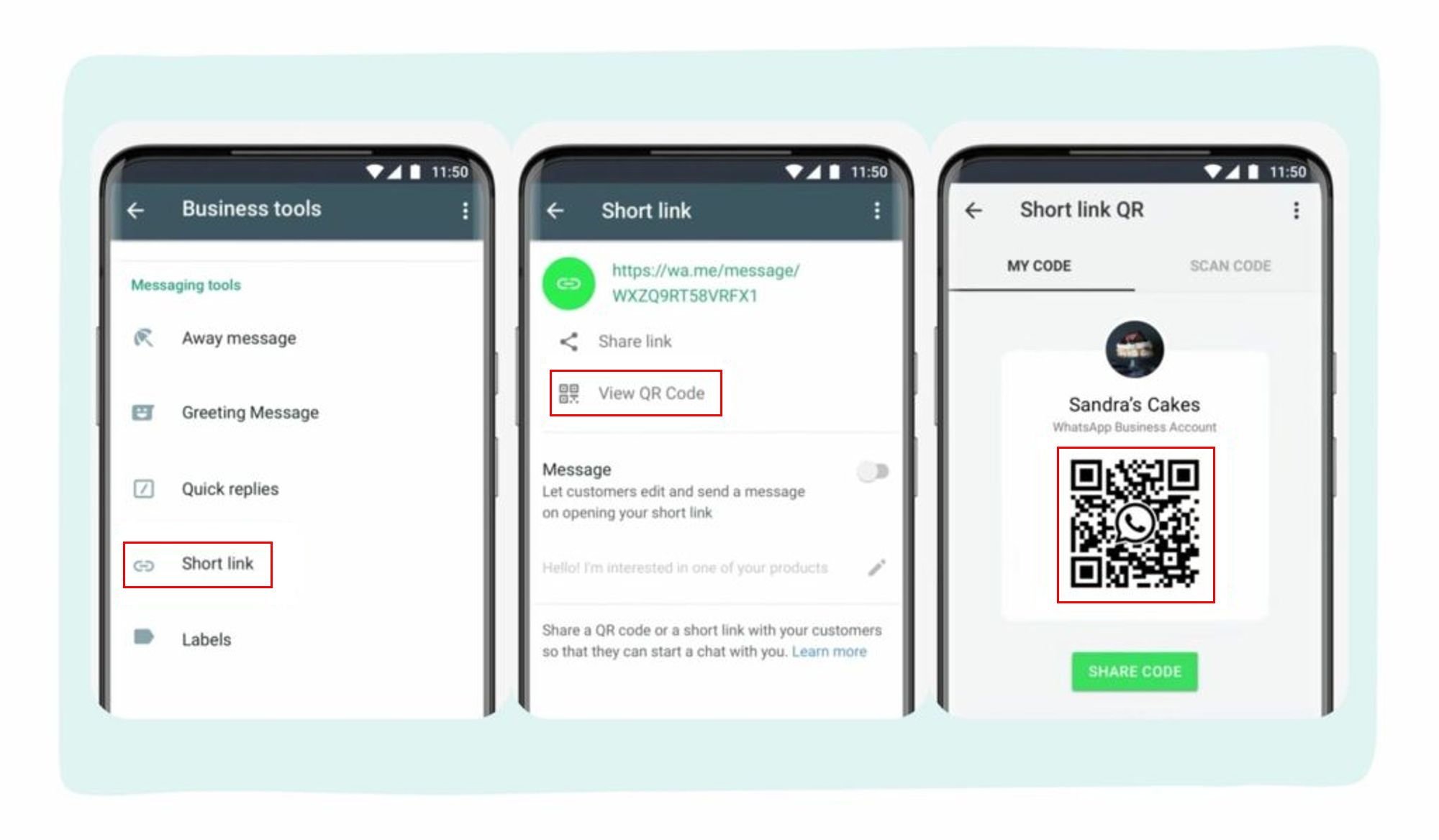
Source: ShopPop
Broadcasts. These are mass text message campaigns sent to a large number of contacts. It’s the WhatsApp equivalent of a newsletter or a promotional SMS notification. But with the Business app, you can only send a broadcast to 256 contacts at a time.
Choosing the contacts is not easy either. You can select them manually from your phone contacts list or use labels within the app. The last catch is that recipients must have your phone number saved to receive the broadcast. Otherwise, you can send as many such messages as you want in chunks of 256 contacts.
Automated messages. There are three kinds of automated WhatsApp messages available to speed up your communication on WhatsApp Business.
- Greeting messages can be set up to automatically respond to new chats. So when a user reaches out to you, they’re invited to keep chatting even if you personally cannot answer at the moment.
- Away messages serve as automated responses to inquiries outside of working hours or when your business is closed for vacation.
- Quick replies are saved answers like “Orders take 2 business days to prepare” or “Thank you for shopping with us!” so you can quickly input them from a menu in individual chats when you get a frequently asked question.
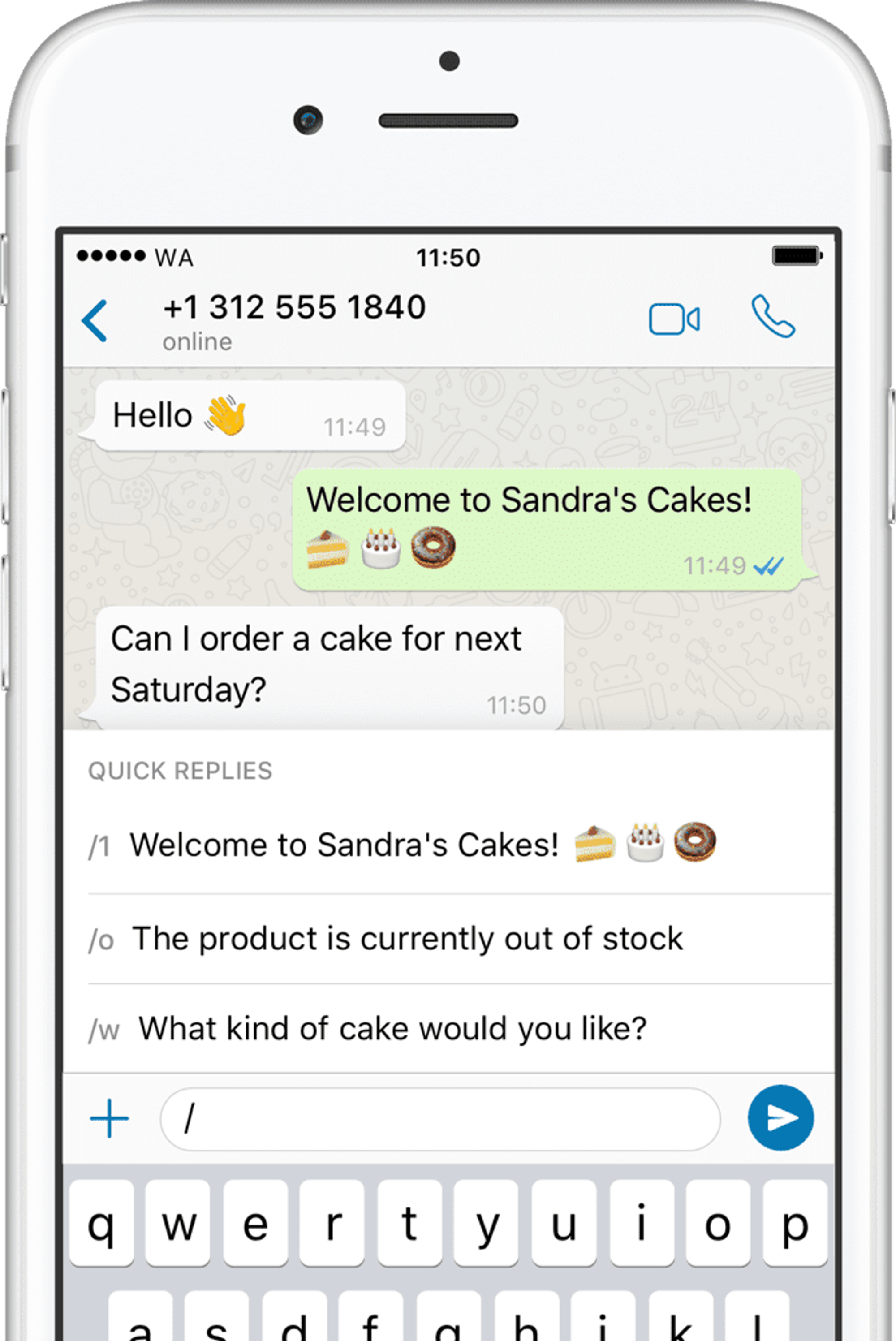
Source: WhatsApp
Key things to know about WhatsApp Business
- It’s free to use
- You need a phone number, separate from your personal one
- One device (max two if you use the web app too), one user only, chats are tied to this account
- It’s a business solution but the offered automation tools are limited
- It’s not scalable, you can only reach a limited number of contacts
- Best for micro and small business owners
In summary, the main difference between WhatsApp and WhatsApp Business is that the former is strictly for personal communication while the latter gives you some marketing tools. WhatsApp Business is a free option for small local businesses looking just for a way to answer questions and take orders via chat.

Source: Meta
3. WhatsApp Business API
The WhatsApp Business API is a separate service from the regular WhatsApp Business app.
It's designed for medium to large businesses and offers a wider range of marketing tools.
Unlike the WhatsApp Business app, the API doesn't have its own interface. Instead, it works through the interface of another platform that it's connected to, like a CRM or email marketing tool.
To use WhatsApp Business with the API, you'll need to connect through a Meta business partner,
This setup allows businesses to integrate WhatsApp into their existing marketing tools, like managing communication from Facebook Messenger and WhatsApp in one place.
The API also provides additional features beyond what's available in the regular WhatsApp Business app, making it a more comprehensive communication management tool.
For large-scale campaigns and business growth, connecting to the WhatsApp Business API is the way to go.
WhatsApp Business API features
User access
Unlike WhatsApp Business, the API offers unlimited users and devices under one account. This makes customer support and messenger marketing a lot more effective.
Account creation
To start using the API features, you need to apply for an account through a WhatsApp partner and provide information about your business to get verified.
Also, through the API is the only way you can submit an application for a green tick mark to appear next to your business name in chats. It adds legitimacy in the eyes of your recipients.
Contact management
A major difference between WhatsApp Business and WhatsApp Business API is the way contacts are handled. With the API, they’re imported from the CRM or another marketing platform where your opt-in lists are stored.
Consent to WhatsApp marketing is gathered in two ways: WhatsApp users message the business account first, or they tick an opt-in box for WhatsApp specifically in a signup form. Contacts that didn’t consent to be contacted via WhatsApp cannot be messaged through the API. This protects the customer experience on the app.
The upside is that you can grow your WhatsApp opt-in list through your website, emails, and other channels. On the free app, contacts have to have your number saved to receive your messages, which is very limiting.
Types of messages you can send via WhatsApp API
The API is a messaging alternative (or additional channel) to email marketing. Also, you can present your brand in a business profile just like with the WhatsApp Business app.
So what are the differences between WhatsApp Business and WhatsApp Business API?
- Session messages
Someone (customer, lead, contact) starts a chat with your business account. You have 24 hours to answer or the chat expires. If the person messages you back, the 24 hours reset and so on. These are session messages in WhatsApp. The idea is to give the customer control over the communication — if they don’t want to chat with you any more, that’s that.
- Broadcast messages
Broadcast messages must follow the template guidelines and need to be approved by WhatsApp before sending to protect recipients from spam. The good news is, unlike WhatsApp Business, via the API you can broadcast to as many contacts as you want and they don’t have to have your number saved to receive the message.
A real game-changer is the interactive messages, though. You can send messages with quick reply buttons attached. Recipients just tap on the answer they choose and it gets sent back to the conversation for you to continue engagement.
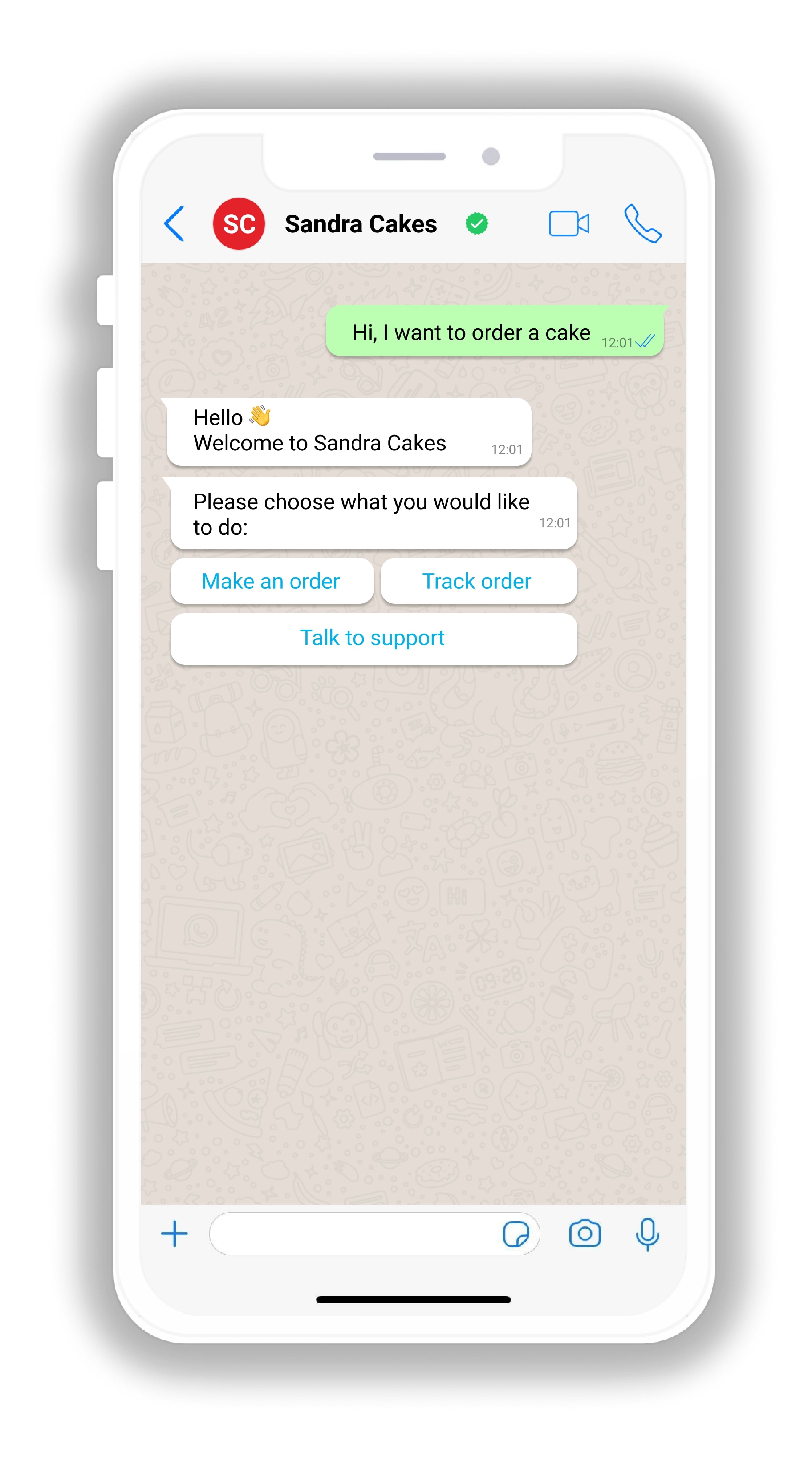
- WhatsApp groups
Via the WhatsApp Business API, you can create and manage group chats. Contacts must be invited via a special message to join, it’s for end-user protection from spam and unsolicited messages. But groups are great for brand engagement, market research, and loyalty.